(55 products available)




























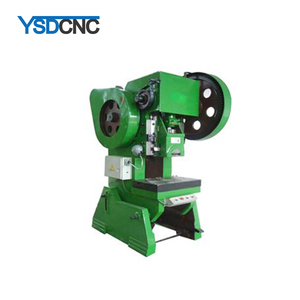
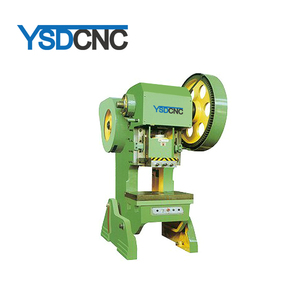
















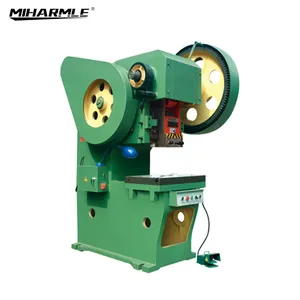
















































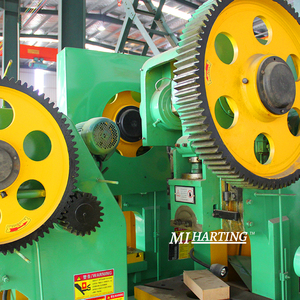






















































































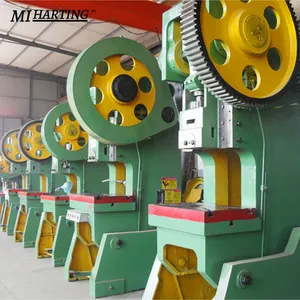



































































The Germany standard punch press machine is manufactured to meet various requirements. Some common types include the following.
Mechanical Punch Press Machine
This machine uses a motor-driven geared crank to move the ram. It has a sturdy construction to handle heavy-duty punching operations. Mechanical punch press machines are suitable for high-volume production lines where machines must work continuously. Operators can do a manual punch press on this type of machine. However, it is not safe for poorly trained operators. The mechanical punch press machine may not be suitable for schools or small shops because of safety concerns.
Electromechanical Punch Press Machine
This machine has an electric motor that drives its punching tool. It converts electrical energy into mechanical energy through a reduction gear system. An electromechanical punch press machine offers the benefits of better precision and reduced noise over mechanical punch presses. Motor control also improves workflow. It is more suitable for factories that need smoother operations and lower noise disturbance.
Hydraulic Punching Press Machine
This machine uses a hydraulic system to move the ram. It has high flexibility and can handle various punching operations. A hydraulic press provides a lot of force without breakdown. Operators can use it for heavy-duty jobs without overheating. It can work very thick material, too. So, this punch press works better when there is a heavy workload. Press hardened die sets, roller leveling dies, or contour dies for hydraulic presses are suitable accessories.
CNC Punch Pressing Machine
A CNC punch press machine has a computer numerical control. Its controller and software allow precision punching. This machine can make complex shapes without needing a single die. A CNC press punch machine also allows automation. Automated tools reduce the need for manual effort and improve productivity.
Portal Punch Press Machine
Also called a gantry punch press, it has a rail system to guide the punching head. The punching head moves through an open frame. This machine can handle large workpieces. It is suitable for cutting big sheets of material into specific shapes. A gantry punch is also good for precise machining and high-volume production.
The following corresponds to general specifications for a punch press (Germany standard) machine:
Capacity
This refers to the maximum cutting power or tonnage the machine delivers. It usually ranges from 10T to over 1000T.
Bed Size
This is the work table area that holds the workpiece. The dimension of the work bed usually corresponds to the overall dimension of the machine.
Typical bed size dimensions are as follows; 600mm x 400mm, 1250mm x 2500mm, 1500mm x 3000mm, and custom sizes.
Control System
A punch press machine's control system can be manual, NC (Numerical Control), or CNC (Computerized Numerical Control). Modern machines have the CNC type for better accuracy and automation.
Power Source
This refers to the source that powers the machine - electric, hydraulic, or pneumatic. An electric punch press machine uses an electric motor, and a typical power requirement is 380V/50Hz/3Phase. A hydraulic machine depends on hydraulic force, and a pneumatic punch press uses compressed air.
Tooling
These are the specific dies and punches used for certain applications. The tooling type directly affects the capacity, control ability, and machinability of the punch press.
Weight
A punch press machine can weigh anywhere from a few tons (2000+ kg) to 40 tons or more, depending on the size and capacity.
Routine maintenance is essential for ensuring optimum performance, prolonging service life, and preventing breakdowns. Here, we highlight the necessary punch press machine maintenance tips:
Regular Lubrication
Machine components that need lubrication include pins, shafts, gears, guide rails, reducers, clutches, and gearboxes. Select machine oil that satisfies the material specification for each component. Also, use the right lubricant application tools and methods. Lubricate parts during installation and reseal after applying lubricant. Lubricate regularly based on usage frequency or monthly.
Check Fasteners
Inspect all fasteners and check for loosening regularly. This also includes bolts and nuts. Use the proper torque to fasten, and apply thread locking agents where necessary. Regular checks prevent accidents or machine damage from loosening components.
Cooling System
Maintain the hydraulic system and oil cooling system by inspecting hoses, oil levels, filters, and pumps. Replace hydraulic oil based on usage conditions or at least once every year. Clean the oil cooler regularly to remove any dust or particles. Apply thread seal to hoses and inspect pump function at every scheduled maintenance.
Check the Die and Punch
The key components to inspect are the die and punch for any wear or damage. Specifically, check for signs of distortion, chipping, or cracks. Conduct repairs or replacements on damaged parts immediately. Inspect die and punch alignment and adjustments. Ensure proper lubrication before every use.
Industry manufacturing:
In-mold industry manufacturing, punch press machines create a variety of things, such as mechanical parts, structural components, brackets, and gears. Fundamentally, these parts are made from sheets of metal. Generally, the machine can be used to flock punch different internal and external shapes of mechanical parts. This includes through holes, contoured outlines, and a combination of both.
Auto parts manufacturing:
Punch press machines can also manufacture automobile accessories, including bumpers, chassis, frames, and vehicle body trim elements. Thanks to standardized automated production methods, these machines allow for 15-minute rule punch time, which is sufficient for efficiently producing high volumes of car components. As fundamental building blocks of cars, auto parts are usually made of metal. Now, there is an array of high strength and lightweight alloys available for choice.
Electronics industry:
Electronics industries utilize punch press machines to produce precision components such as connectors, switches, relays, and circuit board elements. An example includes the "stamping relays", which are formed from electrode bridges and contact parts that were previously made from conductive alloys using a mold punch press.
Aerospace industry:
In the aerospace industry, punch press machines manufacture aircraft components, engine parts, and structural elements for the aerospace industry. They are also suitable for high-precision punching operations in small batch production. Generally, this means that punch presses can be used to swiftly and precisely cut out tiny amounts of metal to make prototypes for complex aircraft structures. Additionally, the machines have high production efficiency and good processing accuracy.
When choosing a punch press machine, many factors need to be taken into consideration to ensure the final model selected will meet business needs.
Size of operation
Consider the size of the operation. Is it a small team with limited manufacturing requirements or a large team with wide-ranging needs? For small operations, a bench-type punching press machine may be more suitable. But for large-scale operations, having a large punching press machine with a higher capacity and advanced automation features may be better.
Complexity of projects
Consider the manufacturing needs. The projects in the workshops need to be considered, including the sizes and thicknesses of the materials and the shapes and sizes of the punches. Surplus small double action punch press dies may deliver the desired results. At the same time, large standard punch press machines with more significant tonnage may be necessary for more extensive projects.
Space and budget constraints
As large machines take up more floor space and require more energy, considering the work floor's available space and budget for electricity bills is essential. Considering the maintenance and repair costs of the machines is also necessary.
Quality and reputation
When purchasing a punch press machine, it is ideal to purchase from suppliers who offer after-sales services and warranty programs so that businesses can be confident in the machines and their services. This also helps buyers when reselling, as they can provide their customers with warranty services.
Q1: How does a punch press work?
A1: The punch press machine applies pressure to the punch that then inserts the metal into different shapes and cuts. The die then holds the metal to create the shapes and engravings. Once the metal shape is complete, the ejector system releases the new metal shape.
Q2: What materials can Germany standard punch press machines work with?
A2: Generally, punch press machines work with various metals, such as carbon steel, alloy steel, stainless steel, copper, aluminum, brass, etc. However, depending on the punch press machine's design and specifications, the material must be of a thickness that the machine can effectively manage. In addition, the material has to be compatible with the tools, dyes, and lubrication systems used in the punch press processing.
Q3: Are punch presses still used?
A3: Yes, punch presses are still used in various industries and manufacturing applications.
Q4: What are the types of punch presses?
A4: There are many types of punch presses, such as straight punches, crank punch presses, knee-type punch presses, hydraulic punch presses, among others. Each type functions differently and specializes in its own manner.